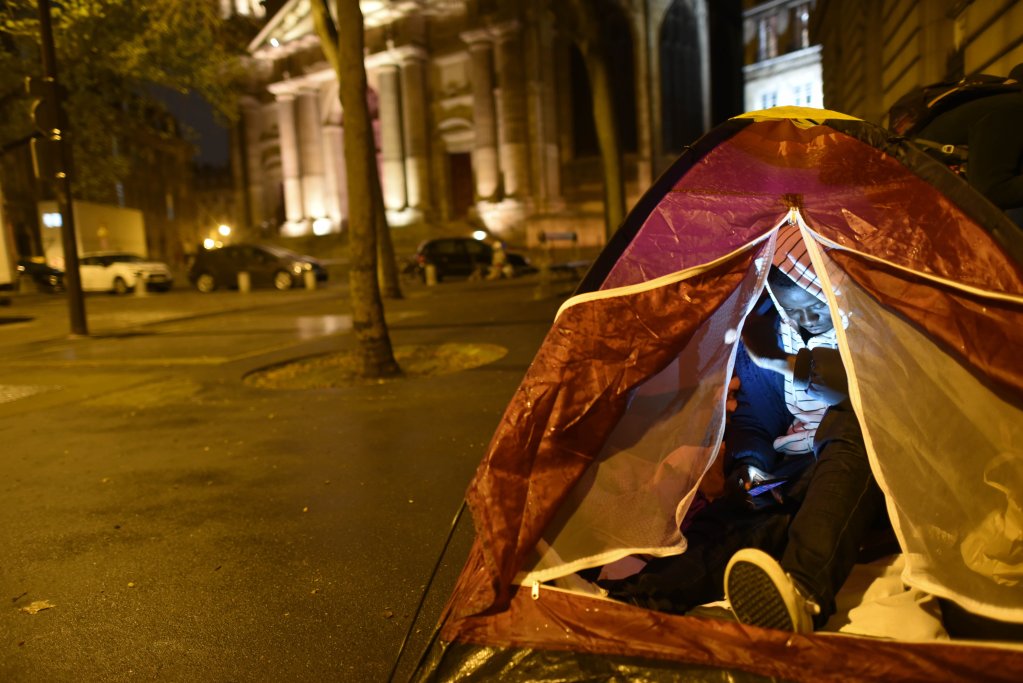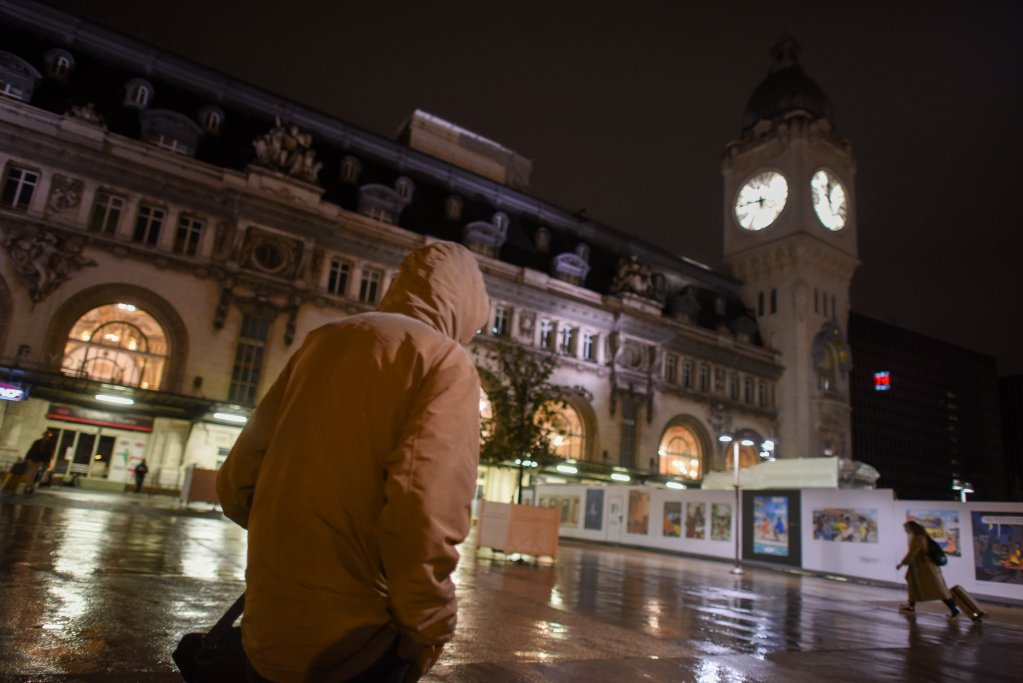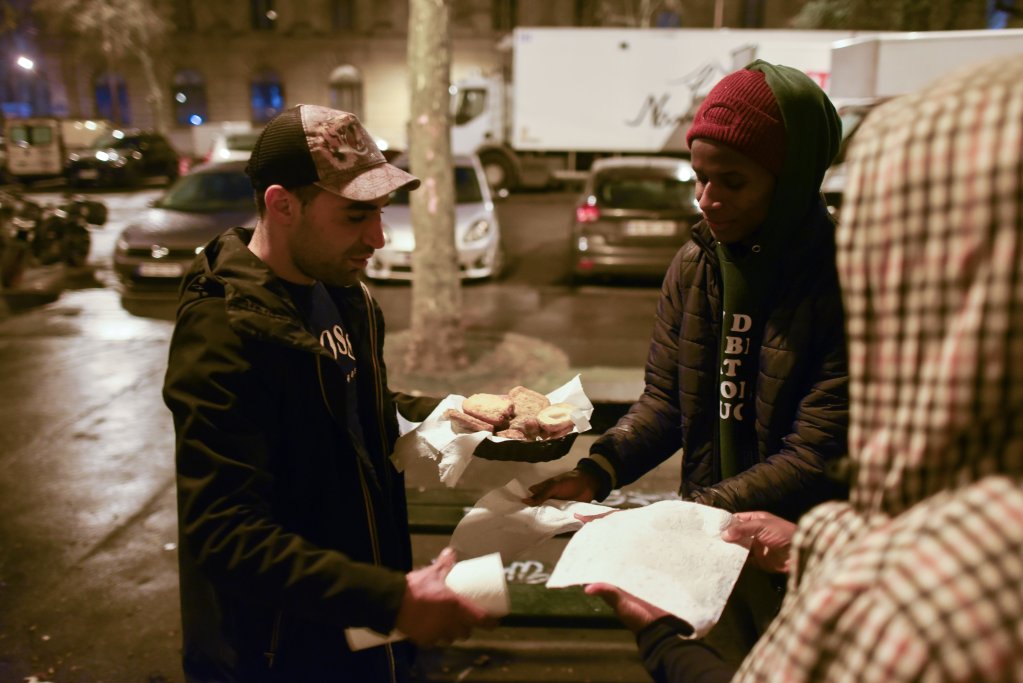Unaccompanied homeless youth in Paris: “We used to look for …
Since December, Parisian authorities have taken to systematically dismantling migrant encampments without proposing housing alternatives. Unaccompanied minors bear the brunt of these operations: every night, they look for places to hide in Paris. To remain undetected, they stay alone or in small groups, slipping further and further away from the reach of associations.
Alpha* is worried. The young 15-year-old Guinean arrived in Paris two weeks ago, and he fears the night that is coming. "Do the police have the right to be violent towards us here?" he asks a volunteer from a migrant solidarity organization. "Their uniform said 'city police'.
What can they do to us?" It is 7:30 p.m. near city hall, where young people can go to receive a free meal each night. Alpha finds it hard to stay put.
"If I stay, will I be in trouble?" The teenager fears the police more than anything. He's been forced to deal with them twice already.
"They arrived three or four days ago, around 1 in the morning. I was with two other people near place de la Bastille. They asked us to leave.
They did not hit us, they shook the tent," he said. In the middle of the night, Alpha and his friends packed their belongings and set off to find another place to hide. But a few days later, the same scene, again.
"The police found us again. My friends got scared, they left, they don't want to be deported. I don't know where they are.
I stay alone now."
"Zero-tolerance policy"
Migrant camps have been strictly forbidden in Paris over the past few weeks. "It's a zero-tolerance policy," Nikolai from Utopia 56, a Parisian migrant assistance program, said. Pitching a tent in public was never allowed, but a policy of tolerance allowed groups of unaccompanied minors to sleep peacefully in parks or squares and leave in the morning, covers and tents folded in their backpacks. That era is over.
Not only are young people not allowed to unfold their tents, but they cannot move in groups either. Being alone remains the best way to stay discreet.
 Young people get ready to spend the night under their tent, place Saint-Gervais, in Paris, but also fear getting displaced by police.
Young people get ready to spend the night under their tent, place Saint-Gervais, in Paris, but also fear getting displaced by police.
Photo: Mehdi Chebil
"Since December and the last sheltering operation, young migrants' camps, even those made up of four or five tents, are systematically dismantled," Alice, another member of Utopia 56 said. Tonight, she is at City Hall to orient and reassure the young migrants. Some teens, like Alpha, are opting to forgo tents and groups, sleeping under the open sky alone.
"Too visible," he says again, shocked from being awoken brutally by police. "We have young people who, tired from getting their tents and covers taken away, do not ask for them anymore," Alice told InfoMigrants. "The situation is dramatic. Each mini encampment installed on the side of the curb or under a bridge has a lifespan of less than three days when it's spotted by police." The street is the only place left for these youngsters who just arrived in Paris.
Solidarity housing or social hotels are already saturated and prioritize families with infants. While waiting for their young age to be recognized, these underage migrants are not helped by the state, and have to get by on their own.
"Finding places to hide"
The Midis du Mie, another organization helping young migrants, estimates that between 200 and 300 unaccompanied minors live on the streets of Paris. Most come from Western and sub-Saharan Africa.
"Part of them are housed in our shelters but those who just arrived in France, who are here for a week or two, often have no other solution," Agathe Nadimi, founder of the organization, explained to InfoMigrants. How many sleep at night on cardboards? It is hard to say.
About 50 people were there that Thursday night at city hall, the most well-known meeting point for Paris's young homeless unaccompanied migrants. "They come here to eat, get covers and leave. And during those two hours, we get an idea of how many they are and what they need," Alice told InfoMigrants.
 Alvin, a 17-year-old Guinean, sleeps alone near Gare de Lyon. Photo: Mehdi Chebil
Alvin, a 17-year-old Guinean, sleeps alone near Gare de Lyon. Photo: Mehdi Chebil
Alvin is 17. Sitting with other young migrants in the plaza behind city hall, this young Guinean doesn't stick around for long. "I just come to chat with others a bit."
Alvin arrived in Paris on March 17 and spends his nights alone near the Gare de Lyon train station. He is reluctant to show us the place he found to sleep that night, probably feeling ashamed. "Don't worry, I know how to get by and find a clean place, without urine, without danger," he insists, looking at the rain falling on the train station, his bag over his shoulder.
Alvin keeps his yellow cover inside. "I also have clothes to change into inside," he says proudly, laughing. No tent? "No, where would I put it? I don't feel cold.
And one always finds cardboards outside to protect yourself from humid ground, that's enough for me." He pauses. "In any case, that's all temporary, I will get through this." To sleep a few hours without being disturbed by authorities, young boys like Alpha and Alvin look for places ever more hidden. "We used to help them find safe shelters, now we help them find hiding places," Alice of Utopia 56 told InfoMigrants.
Volunteers brainstorm solutions, sometimes surprising ones: setting them up under a merry-go-round? "No, the teens are scared. It's scary, a merry-go-round, at night." Behind scaffolding? "It's discreet but can be dangerous."
Becoming invisible is to become prey
Some youngsters like Cisse and his friends, all Ivorians, found a spot by themselves. They proudly keep their new hiding place a secret. "It's somewhere in the 20th arrondissement, the police don't see us.
But we have to be discreet, we don't speak loudly, and try not to make too much light with our phones," Cisse explains, refusing to bring us there.
 A neighbor approaches with vegetable galettes for homeless young people, on March 30, 2023. Photo: Mehdi Chebil.
A neighbor approaches with vegetable galettes for homeless young people, on March 30, 2023. Photo: Mehdi Chebil.
Utopia 56 said the upcoming 2024 Olympics couple be pushing authorities to toughen their dismantling policy.
"Paris has to hide its migrants before welcoming the whole world," Nikolai said. With dramatic consequences. When the youngsters become invisible, they become prey.
"They disperse, hide. More and more slip away from our reach. We cannot protect them, we are worried that by isolating themselves, they will fall into the hands of criminal networks," Alice explained to InfoMigrants.
That night, after the volunteers left, a dozen young migrants decided not to run around Paris. It is 11 p.m. They set up their tents, already drenched by the rain, by Place Saint-Gervais, out for everyone to see.
"I was afraid," Mohammed, a 16-year-old Ivorian, admitted, awoken by our presence. "I told myself: 'Oh no, not the police already... I've been lying down for only 10 minutes!'" Some around him laugh. A neighbor approaches the tents offering vegetable and potato-based galettes wrapped in paper towels.
Most of the teens are already asleep. "I would obviously be somewhere else if I had a choice," Mohammed said, after taking two galettes and protecting them from the rain. "I've been in Paris for 20 days.
20 days of breaking my back. I don't understand why they are being so hard on us."
In February 2021, Paris opened a shelter in the 15th arrondissement dedicated to these young boys whose age is under question. The center was hailed by NGOs but criticized for "not meeting the scale of the issue." 40 spots are open, and all are taken. When we mentioned the center to Alpha, the young Guinean near Bastille, he shrugged. "Your special center, that's the 115 [emergency help line]?
Ah it's something else... Okay, cool." He did not ask for more information.
"Every time you're told you'll get help, it never works.
Your center, there's no point in trying, I'm tired."
*All names are anonymous